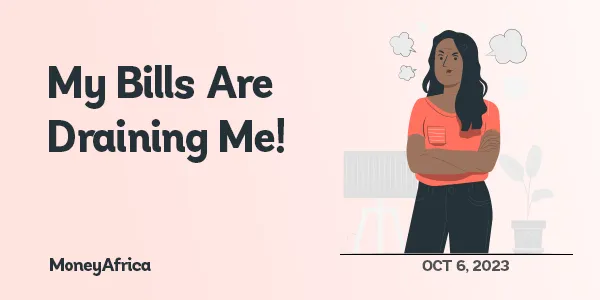Good Afternoon 😃
How are you doing?
Friday letters are usually dedicated to taking questions from our community. Do you have a question for us? Please feel free to
- send an e-mail to info@themoneyafrica.com; or
- send a DM to any of our social media channels, or
- simply fill out this form. Don’t worry, your responses are kept anonymous.
***
Question
Please explain the following to me as you would explain to a child: high or low-interest rate, high or low inflation rate, high or low consumer price index (CPI), as well as their causes and implications on the economy.
Answer
Think of interest rates as the “price” of borrowing money. If interest rates are high, it’s like having to pay a lot extra when you borrow money. This can make it more expensive for people and businesses to take out loans. On the other hand, if interest rates are low, borrowing money becomes cheaper, and it can encourage people to spend and invest more.
Inflation is like a slow-motion price increase. Imagine you have a favourite snack that used to cost ₦300. But every year, the price of that snack goes up a little bit. So, next year, it might cost ₦400, and the year after, ₦500, and so on. This means your ₦300 can’t buy as much as it could before because things are getting more expensive.
CPI is like a shopping list that tells us how much everyday things, like food, clothes, and other essentials, have changed in price over time. It helps us understand if things are getting more or less expensive for regular people. When CPI is high, it means those everyday things are getting pricier quickly. When it’s low, they’re not going up in price as fast.
High-interest rates can happen when a country’s central bank wants to slow down spending and borrowing to prevent the economy from overheating or to control inflation. Low-interest rates can be used to encourage spending and investing during economic slowdowns.
A high inflation rate is essentially caused by too much money chasing too few goods. It can happen when the economy is growing too fast. A low inflation rate usually occurs when the economy is slow, and there isn’t much demand for goods and services.
When there’s a high CPI, it means the prices of everyday things are going up because of factors like increased demand or rising production costs and when there’s a low CPI, prices of everyday things aren’t rising as fast, often during economic downturns when people are spending less.
These are some simplified implications that each economic indicator can have on the economy:
- High-interest rates can slow down economic growth but help control inflation.
- Low-interest rates can boost economic activity but might lead to higher inflation if not managed well.
- High inflation rates can erode people’s purchasing power and savings.
- A low inflation rate is generally considered good, but if it’s too low, it might signal a stagnant economy.
- High CPI can make it harder for people to afford the things they need.
- Low CPI is generally better for consumers as it means prices are stable or rising slowly.
***
Question
I usually don’t have any money when it’s time to pay my bills before the next salary comes in. What should I do?
Answer
It’s a common challenge many of us face from time to time. Managing finances can be tricky, but there are some steps you can take to help smooth things out. First, create a budget. Creating a budget is a fantastic starting point. It’s like your financial map, helping you keep tabs on your income and expenses. Think of it as a guide that gives you a clear picture of where your money is flowing. By knowing where your hard-earned cash is going, you can make smarter spending decisions and plan ahead more effectively.
Next, try to build an emergency fund over time. Building an emergency fund is like having a financial safety net. It’s a friendly way to prepare for life’s unexpected twists and turns. Even if you can only set aside a small amount each month, over time, it can add up to create a buffer that’s there when you really need it.
When it comes to boosting your financial health, think about expanding your income avenues, like exploring side gigs or freelancing. Also, keep an eye out for opportunities to save money. You can start by trimming non-essential expenses. Start by asking yourself every time you go shopping if what you’ve picked is really a “need to have” or a “nice to have”.
It’s a good thing that the month just began so you can start practicing the steps that I have just provided. It wouldn’t be easy at first, especially if it’s something you’re not used to but, with time it gets easier and your life will become stress-free because you’d have more control over your finances.
***
Would you like to know the state of your finances?
Take this test to see how you are doing financially
***
Do you know that we have our own podcast? It’s MONEYTALKS!💚
Here’s a link to listen to all the amazing episodes we have!
***
Thank you for reading Money Africa’s Blog.
Please feel free to share it.
MoneyAfrica premium plan
Are you a mid to high-income earner? Do you find communities a bit too busy? You should sign up for our premium plan.

You can learn more about that here.
***
We often get questions regarding how to plan your finances to align with your relocation plans, especially for students seeking to further their studies. As always, we have heard you, and we have put together an e-book to help you navigate this. Follow this link, to get your FREE copy of the e-book: The Japa Encyclopedia.
***
Get our annual subscription and learn more about investing safely and building a solid portfolio in 2023.
Don’t forget to:
- Join our community, if you want to smash your 2023 financial goals. It takes at least 30 days to build great habits that will last you a lifetime. So why not start now? There is a lot you can achieve.
- If you would like to document your financial journey in 2023, then our journal would be an excellent fit for you. It costs ₦7,500 (excluding delivery).
- Get a budget sheet to track your monthly expenses. Click here
- Get an investment tracker to be on top of all your investments. Click here
MoneyAfrica is a financial literacy platform. Our goal is to make everyone better with their finances.
We do this by engagements via our:
– social media handles
– platforms for paid community members (for adults and students)
– webinar sessions with corporate clients
Would you like to join any of the communities? Please click here
Would you like us to hold a webinar for your company’s staff? Please send an email to info@themoneyafrica.com


